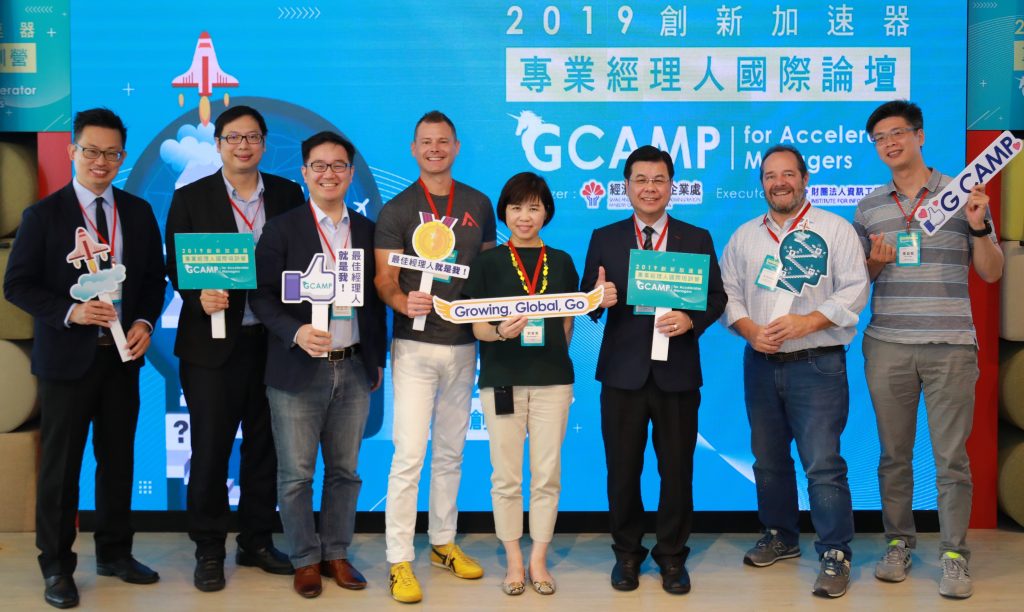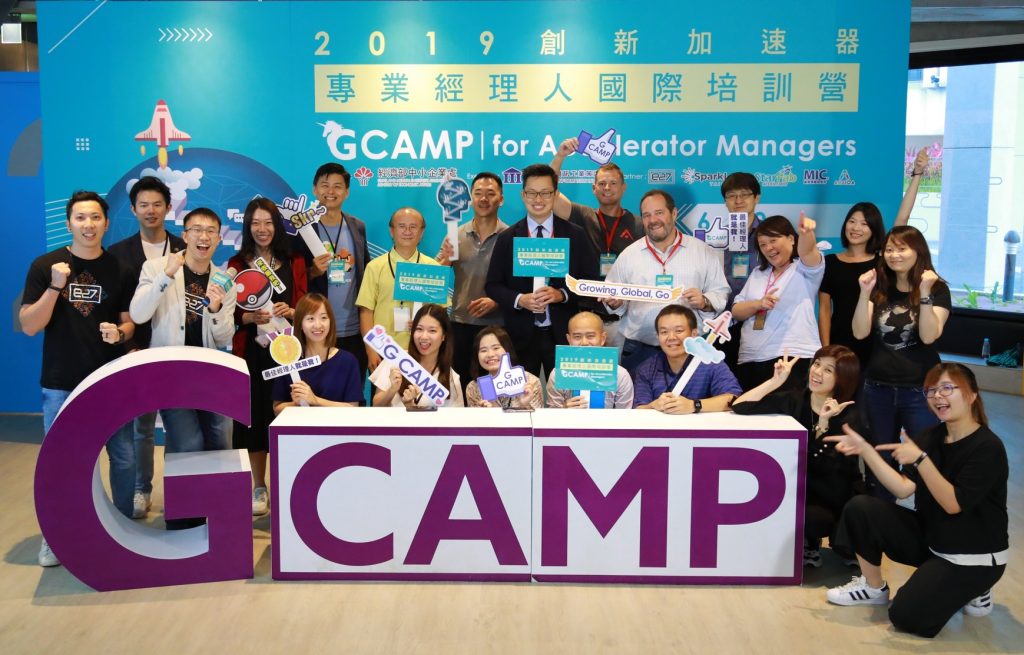G Camp for Accelerator Managers is changing the game for accelerators in Taiwan and beyond

For the past few decades, Taiwan has crystalized its position in the global tech spectrum as a hardware manufacturing powerhouse, with corporate giants in semiconductor and computer manufacturing having headquartered in the country. It maintains this position to this day, but has also seen recent developments in various other areas including AI, IoT, robotics, fintech, and many others.
As we witness this paradigm shift in Taiwan’s digital culture that puts a shared focus on both hardware and software efforts, we also unravel the importance of accelerator programmes not only from the perspective of startups, but from the perspective of corporates as well.
As such, one important accelerator programme to come our way is the G Camp for Accelerator Managers, an event that merged forums and training programme under one umbrella to wring out the best possible results for all parties involved.
What is G Camp for Accelerator Managers all about?
The G Camp for Accelerator Managers seeks to improve the overall competence of the Taiwan accelerator ecosystem. It’s the first accelerator manager programme that focusses on managers’ competitive capabilities and is brought to us by the Small and Medium Enterprise Administration (SMEA) Taiwan, partnering with the Institute for Information Industry (iii) and e27.
The Small and Medium Enterprise Administration is the trade and industry wing on Taiwan’s Ministry of Economic Affairs. Some of their responsibilities include formulating plans for SMEs and other relevant legislation, providing guidance to and undertaking the inspection of SMEs, and promoting the improvement of SMEs’ production technology, training, and other related matters.
With these responsibilities in mind, the G Camp for Accelerator Managers came with a flurry of features including key partners and mentors encompassing a wide array of expertise. Some of these partners are Accelerating Asia Venture, Asia Development Bank (ADB), Blackstorm Consulting, SparkLabs Taipei, Startup Genome, and StarFab Accelerator.
At the G Camp for Accelerator Managers, mentors and speakers shared insights that seek to answer questions on why enterprises and corporations should venture into new businesses by implementing accelerator programmes.
SMEA recognizes the value of accelerator programmes within the framework of Taiwan’s booming startup ecosystem. This is why there is a need to further scale it up by encouraging partnerships with more international and home-grown accelerator programmes to support the local startup ecosystem.
SMEA is currently working with Microsoft Taiwan, APTG, Chunghwa Telecom, Mighty Net, and Formosa Television to kick-start the tech innovation pilot programmes among their local corporations and speed up industry transformation.
The importance of accelerator programmes in Taiwan’s startup ecosystem
How accelerator programmes matter transcends the typical understanding that corporates are only out there to funnel money into innovative ideas for no reason. Accelerator programmes are special precisely because of its unique mutually beneficial nature—one that can be enjoyed by both startups and corporates.
On the one end, startups can acquire capital and more business opportunities through the network and body of work being tapped in the partnership, while on the flip side, corporates have the unique chance to digitalise their endeavors and go through innovative transformations with the help of bright new startups.
It is imperative, however, to note that partnerships between startups and corporates are best defined through accelerator programmes because in collaborative work, finding the perfect fit is an integral ingredient, and doing so requires a rigorous process of understanding who you are partnering up with.
Accelerators are important because they help you define and identify your company (what it is, and what it wants to be) and decide for yourself if any partnerships made are consistent with your goals and your culture.
Other features accelerator programmes have are networking opportunities, grants, and insight-sharing from some of the industry’s best and brightest—a perfect opportunity to run and test ideas while getting valuable feedback from those whose business stamina have stood the test of time.
Keynotes from industry leaders
In the tradition of learning, G Camp for Accelerator Managers featured a series of master classes spearheaded by some of Southeast Asia’s tech giants.
Paddy Tan, co-founder of BlackStorm Consulting, advises business leaders on strategic planning and positioning, helping them to increase profitability and pivot their business to gain a competitive advantage in their respective industries.
His love for technology is rivaled only by his passion for business. After running several companies and working on multiple verticals including cybercrime, IoT, Fintech, logistic, mobile security, and manufacturing, Paddy has developed a strategic thinking process and framework to help companies with their growth and scalability challenges.
He is also a resident mentor for BASH (Build Amazing Startups Here), where he offers advice to commercial accelerator, corporations, and institutions of higher learning part of the accelerator programmes. He also serves as mentor and advisor to UOB FinLab, AIRmaker accelerator, and Platform E companies.
At G Camp Accelerator for Managers, Paddy spoke about how biz growth can be done through 3 main aspects: products, markets, and processes. Additionally, he discussed the merits of scaling your business, exploring the difference between growing and scaling.
On the other hand, Craig Dixon, CEO of Accelerating Asia Ventures, discussed the different application criteria that includes team, traction, business model, coachability, programme fit, diversity, and social impact, among others.
Craig Dixon spent two years as programme manager and entrepreneur in residence at muru-D Singapore. There, he spent his time recruiting the best founders in SEA to join the best accelerator in Southeast Asia manage startup selection process, maximizing founder’s route to success coaching, mentoring, advising founders, building and curating the accelerator program, managing their network of mentors, investors, and advisors.
His job in a nutshell is basically to look for new ways to help awesome people become successful startup founders, other awesome people to successfully invest in startups, and just generally to add value to humankind’s effort to innovate our way out of the biggest challenges.
G Camp for Accelerator Managers also showcased a panel of experts who discussed matters surrounding businesses such as Venture Capital (VC). He also laid down a comparative analysis on what separates accelerators from incubators, and deconstructed exactly what it means to be an entrepreneur especially in this time and age.
The key takeaway from the discussion is how training, mentoring, business support, and selective process are the core similarities that binds incubators and accelerators together, but they are set apart by the technical aspects of how each programme goes about.

G Camp for Accelerator Managers’ vision for Taiwan
The main thrust of this programme centers on building a better tech ecosystem for Taiwan’s already flourishing startup culture.
Congruent to SMEA’s vision to create an environment that’s beneficial to the establishment and growth of SMEs in Taiwan, G Camp for Accelerator Managers complements their vision by creating better platforms for international and home-grown companies to tap into Taiwan’s talented pool of tech innovators and startup entrepreneurs.
From insight-filled talks and forums, to the expansion of network for all parties involved, G Camp for Accelerator Managers leaves a stamp in the lives of those who participate in it—all this and more await the future of Taiwan.
The post Why are accelerators important? G Camp for Accelerator Managers has you covered appeared first on e27.